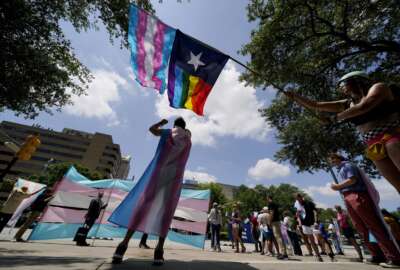
LGBTQ youth with military parents are at risk of mental health issues, new study says
LGBTQ kids in military families are more likely to experience anxiety and attempt suicide.
As the United States is seeing an uptick in mental health issues with children and teenagers, a new study warns that LBGTQ youth in military families have higher risks of suicide and psychological distress.
The study, conducted by the Trevor Project, a nonprofit focusing on the mental health of LBGTQ people, surveyed nearly 35,000 LGBTQ youths and found that those with at least one parent in the military had higher odds of anxiety, depression, suicide considerations and attempts.
“These data illuminate the disproportionate mental health challenges and suicide risk experienced by LGBTQ+ youth with parents currently in the military. LGBTQ+ youth under age 18 reported higher rates of having a parent currently in the military than their LGBTQ+ peers over age 18,” the study states.
About 1.76 million children in the United States have a parent in the military. Those kids are exposed to larger considerations that cause distress like frequent moves, separations from parents during deployments and fear that a parent may be harmed during deployment.
“Likely due to these stressors, youth with military parents are more likely to report depressive symptoms and suicidal ideation than their peers without military parents,” the report states. “Youth who report that a parent or sibling had deployed also reported higher odds of experiencing sadness, hopelessness, depressive symptoms and suicidal ideation compared to youth who reported no family deployments.”
There not many studies about children in the military, especially those who are LGBTQ. The study is one of the few that hones in specifically on LGBTQ children with a military parent. It’s estimated that about 5% of children with a parent serving are LGBTQ.
Specifically, the report states that those under 18 with a military parent are 34% more likely to have recent anxiety symptoms, 17% higher odds of seriously considering suicide and 36% higher odds of attempting suicide compared to their peers.
Those 18- to 24-years-old were 45% more likely to attempt suicide, but did not have significant associations with higher anxiety or depression.
“Providers working on military bases or with TRICARE should provide LGBTQ+ competency training for all of their staff,” the study recommended. “Additionally, mental health providers not explicitly connected to the military must be prepared to understand the impact that a parent’s military service can have on their child’s mental health, especially for youth who are not living on or connected to military bases and services and whose military connections and stressors may not be as apparent.”
The military has taken some steps to reach out and support families with LGBTQ+ children, especially in states that recently passed controversial laws regarding the inclusion of transgender people and the discussion of homosexuality.
In March, the Air Force offered medical and legal counseling for families in states that criminalized parents taking steps to help children reaffirm their gender.
“The health, care and resilience of our DAF personnel and their families is not just our top priority — it’s essential to our ability to accomplish the mission,” said Air Force Undersecretary Gina Ortiz Jones. “We are closely tracking state laws and legislation to ensure we prepare for and mitigate effects to our airmen, guardians and their families. Medical, legal resources, and various assistance are available for those who need them.”
It is not often that the military services’ personnel departments get involved with local laws.
Former Army personnel chief Tammy Smith told Federal News Network that the military offered assistance right after the appeal of Don’t Ask Don’t Tell, a policy where LGBTQ service members were not allowed to serve openly.
The Army also provided advice to LGBTQ service members before same sex marriage was legal nationally, who were going to states where marriage was legal to wed, and then returning to the state where they resided where it wasn’t legal.
Copyright © 2025 Federal News Network. All rights reserved. This website is not intended for users located within the European Economic Area.
Scott Maucione is a defense reporter for Federal News Network and reports on human capital, workforce and the Defense Department at-large.
Follow @smaucioneWFED
Related Stories






